Australian Pain Society NEWSLETTER









We have a fantastic edition for our members this month.
We are excited to announce the Australian Pain Society funded project “Waiting in Pain II” results have been published. While specialist pain services have grown in number since 2015, long wait times and treatment access inequities persist. Timely access to evidence-based multidisciplinary care is still a health service imperative. Funding reforms and support for community services are needed to support the gains we have made thus far. See inside for more details. Check out the other recent publication by Simon Holiday et al (2020) who provides insight into their research on undertaking evaluation of brief pain education for GP’s on chronic pain management. They determined their educational package was a viable intervention for facilitating the upskilling of GPs for facilitating pain self-management for patients with chronic pain. At a three-month outcome they identified GPs were more empowered in providing nonpharmacological pain self-management interrelated within a harm minimization model for the prescription of opioids. This article is a timely reminder of the recent sobering statistics released by the ABS on 2018 opioid induced deaths in Australia. The Pennington institute of Australia has also recently released their overdose by opioids report for 2019. Unintentional overdose deaths continue to be a significant cause of death in Australia.
Stuck for upcoming holiday book to read or need a hint for a great gift idea? We have a new book review for you by A/Prof Carolyn Arnold on ‘Work and pain: A lifespan development approach’. This book is about chronic pain and Carolyn’s review provides a great summary.
Dr Joanne Harmon
The basic pain special interest group has got your research interests covered; they are launching a new series of regular online BPR pain hour sessions to showcase the latest research from Australian pain researchers. This is an inclusive forum and is of interest to ECRs, students as well as senior colleagues. Check out the next session on mechanisms and management of acute and chronic pain in anesthesiology. Don’t forget to register using the zoom link.
Save the date. The Sunday pre-conference workshops before the APS annual scientific meeting have been announced for 2021, 1821st April at the National Convention Centre, Canberra. There is the all-day ‘I’ve got your back’ workshop focusing on acute and chronic backpain. Plus, there is a wide selection half day workshops from which to choose. All of these workshops provide a great opportunity to catch up and a knowledge refresher.
A friendly reminder for you all to please send the APS newsletter editorial team a short commentary or abstract from your latest article for publication. Our members are keen to hear about what their colleagues are up to and to be able to keep up to date with the latest research.
Until next time
JoanneThe Australian Pain Society is excited to confirm that the 2021 Annual Scientific Conference will be delivered in a hybrid format – combining a face to face event in Canberra with a virtual conference platform.
The Australian Pain Society is 100% committed to bringing you a conference in 2021. Although we hope to meet face to face in Canberra next year, we recognise that our hold on world events is tenuous, particularly with respect to COVID-19.
We are currently working towards bringing you APS 20201 in a hybrid format to give delegates
the opportunity to meet in either the traditional face to face setting or via an online platform. We are also developing a virtual program so that we are prepared, should it be necessary, to convert to a fully online platform.
Rest assured, we will deliver you a high quality Annual Scientific Meeting where you can connect, collaborate, and learn in true APS style. APS will do whatever needs to be done in order to deliver the ASM in the safest possible way in April 2021.
Registrations will open Wednewsday
2nd December 2020
Ensure your APS Membership is up to date to secure savings on the registration fee
YOU
This workshop will focus on back pain, from both acute and chronic pain perspectives. Topics will include; medications, surgical intervention evidence, physiotherapy interventions, gerontology management, and back pain in pregnancy.
This workshop is targeted to all health care workers, nursing, allied health, and medical, including GPs.
When:
Sunday 18th April 2021, 8.30 am – 5.00 pm
Where:
National Convention Centre
Canberra, ACT
For further information please click here
YOU ARE INVITED TO ATTEND THE PAIN IN CHILDHOOD
This workshop is for members of the Pain in Childhood SIG, as well as anyone with an interest in this area of pain.
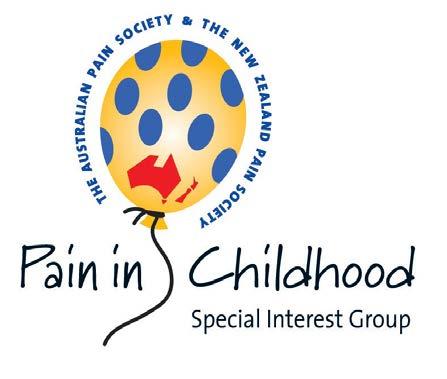
When: Sun 18th April 2021, 8.30 am – 12.30 pm
Where: National Convention Centre Canberra, ACT
For further information please click here
YOU ARE INVITED TO ATTEND THE BASIC PAIN RESEARCH

This workshop is for members of the Basic Pain Research SIG, as well as anyone with an interest in this area of pain.
When: Sun 18 April 2021, 1.30pm - 5.00pm
Where: National Convention Centre Canberra, ACT
For further information please click here
YOU ARE INVITED TO ATTEND THE FUNDAMENTALS OF PAIN
This workshop is a succinct overview of the physiology, clinical assessment, and management of pain. It is aimed at GPs and specialist or allied health clinicians looking for an introduction to, or update on, persistent pain management.
When: Sun 18 April 2021, 8.30 am – 12.30 pm
Where: National Convention Centre Canberra, ACT
For further information please click here
YOU ARE INVITED TO ATTEND THE PHARMACOLOGY IN PAIN MANAGEMENT PRE-CONFERENCE WORKSHOP
This workshop will address topics associated with early identification and management options of low back pain. The workshop will focus on current evidence based pharmacological options in managing low back pain, exploring the safety and efficacy of current treatment options, discussing patient expectations of the role they play, and the role of the clinician in rationalising their usage.
There will be opportunities for questions and networking with peers so that current evidence-based science can be optimised in everyday practice.
When: Sun 18th April 2021, 1.30 pm – 5.00 pm
Where: National Convention Centre Canberra, ACT
For further information please click here
YOU ARE INVITED TO ATTEND THE PHYSIOTHERAPY IN PAIN MANAGEMENT PRE-CONFERENCE WORKSHOP
This workshop will be highly practical – provoking attendees to consider HOW they deliver treatment to their patients. This workshop will be immediately useful in clinical practice as we delve into how to incorporate the best psychological approaches into our own style of intervention.
When: Sun 18th April 2021, 1.30 pm – 5.00 pm
Where: National Convention Centre Canberra, ACT
For further information please click here
The APS Facility Directory is out of date and there is now an alternative that has been based on our work, available on the Painaustralia website.
As such, the board is keen to hear your views about our next steps. Should we
(a) decommission the facility directory and focus information to the public listing of members?
(b) revamp and extend the facility directory? In which case, what information would you like to see added/removed from the current directory
This is your society and your member benefits so we’re keen to ensure that any information we provide to the public is directed by your preferences.
Please let us know your thoughts.
aps@apsoc.org.au
Best wishes, Anne
Thank you to APS members Malcolm N Hogg, MBBS, Michael J Farrell, PhD, Anne L J Burke, PhD and their colleague Anthony Kavanagh, MBBS for sharing the following recent publication.
Article first published online: 27 October 2020
Journal Reference: Pain Medicine
DOI: https://doi.org/10.1093/pm/pnaa374
Link: https://academic.oup.com/painmedicine/ advance-article-abstract/doi/10.1093/pm/ pnaa374/5940671
Objective
To provide an update on Australian persistent pain services (number, structure, funding, wait times, activity).
Methods
An updated national search was conducted. Of those identified, 74 persistent pain services provided detailed responses between July 2016 and February 2018 (64 adult, seven pediatric, two pelvic pain, and one cancer pain). A similar structure to the original Waiting in Pain (WIP) survey was used, and participants chose online or telephone completion.
Pediatric pain services had more than doubled but remained limited. Adult services had also increased, with a concurrent decrease in median wait times and an increase in the number of new referrals seen each year. Despite this, some lengthy wait times (≥3 years) persisted. Wait times were longest at clinics using public or combined funding models and offering pain management group programs (PMGPs). Although clinical activity had increased, medical staffing had not, suggesting that clinics were operating differently.
Privately funded clinics performed more procedures than publicly funded services. Use of PMGPs had increased, but program structure remained diverse.
Specialist pain services have expanded since the original WIP survey, facilitating treatment access for many. However, wait time range suggested that the most disadvantaged individuals still experienced the longest wait times, often far exceeding the recommended 6-month maximum wait. More needs to be done. Numerous developments (e.g., National Strategic Action Plan for Pain Management, health system changes as a result of the COVID-19 pandemic) will continue to influence the delivery of pain services in Australia, and repeated analysis of service structures and wait times will optimize our health system response to the management of this condition.
Although these do not represent a conflict of interest, the authors wish to disclose their commercial engagements. Malcolm N. Hogg’s employer has received an honorarium for medical education and advisory board activity for Mundipharma Pty Ltd and Seqirus Pty Ltd. A.L.J. Burke has received honoraria for General Practitioner and nursing education sessions and steering committee participation from Mundipharma, Therapeutic Guidelines, and Pfizer/Elixir Health. Malcolm N. Hogg is a past president and A.L.J. Burke is the current president of the Australian Pain Society, which receives sponsorship for its annual scientific meeting and research scholarship program from a range of pharmaceutical and medical device companies, including Seqirus, Mundipharma, and Pfizer Australia. The Waiting in Pain II project, which forms the basis of this analysis, is a systematic investigation of persistent pain services in Australia and was funded via a grant from the Australian Pain Society and with the support of the Department of Anaesthesia and Pain Management at Royal Melbourne Hospital.
Thank you to APS members Dr Simon Holliday, Chris Hayes, Newman Harris and Michael Nicholas and their colleagues Lester Jones, Jill Gordon, Catherine Fraser, Carl Holder, Christopher Oldmeadow, and Parker Magin for sharing the following recent publication.
Article first published online: 13 August 2020
Journal Reference:
Health Education in Practice: Journal of Research for Professional Learning, vol. 3, no. 1, pp. 5-25.
DOI: http://dx.doi.org/10.33966/hepj.3.1.14146
Link: https://openjournals.library.sydney.edu.au/ index.php/HEP/article/view/14146
Objective
Active pain self-management (PSM) for patients with chronic pain is assumed to require multidisciplinary care, leaving prescribing analgesics the most accessible option for general practitioners (GPs). We sought to upskill GPs in multimodal PSM with a harm minimisation approach for any opioid prescribing.
Having developed an educational training resource, a multidisciplinary team delivered the program to attendees at a GP conference in 2017. The educational package comprised pre-readings, a 6-hour interactive, skills-based workshop, and post-workshop resources. The single-group intervention was evaluated with an original and unvalidated pre/post-test (three months) survey of four domains: knowledge; attitudes; utilisation
of strategies involving PSM and opioid harm minimization. Paired t-tests were conducted on each domain score and overall, with effect sizes assessed with Cohen’s d. A sensitivity analysis was performed on the data lacking a post-test survey response. Post-survey scores were imputed via chained regression equations, then paired t-tests analyses were conducted on imputed datasets using Rubin’s method to pool estimates.
Of 99 participants, 33 returned both surveys for primary analysis. These were combined in the sensitivity analysis with 60 unpaired surveys. Internal consistency was modest (Cronbach’s alpha 0.736). Primary analysis demonstrated significant self-reported improvements in each educational domain with overall score increasing 10.54 points out of 130 (p<0.001 Cohen’s d 1.11). Improvements were similar in a sensitivity analysis.
This study found that a brief GP educational package may be a viable intervention for facilitating PSM and promoting safer prescribing strategies. Outcomes at three months, from this unvalidated survey instrument, suggest improvements in knowledge, attitudes and self-reported facilitation of PSM and opioid prescribing. As this study did not measure clinician behaviour or patient outcomes objectively, further educational research is indicated to confirm these findings and identify how best to deliver chronic pain management training.
Previous evaluations of pain education for GPs have all focused-on pharmacotherapy, particularly opioids. This innovative and brief workshop focused on upskilling and empowering GPs to provide nonpharmacological PSM integrated with a harm minimisation model for prescription of opioids. This evaluation showed that three months afterwards, scores for knowledge, attitudes and self-reported practice improved, with moderate to large effect sizes. Empowering GPs to utilise PSM micro-interventions should improve rehabilitation outcomes, reduce the initiation or re-triggering of opioid-related problems and improve referral or discharge pathways involving the pain specialist sector. Such training will promote an inexpensive, accessible and holistic modality for dealing with the common and intersecting problems of chronic pain, addictive pharmacotherapy and multimorbidity.
Declaration
LJ, CF, JG, NH, CHo, CO and PM: No conflicts of interest.
SH and CHa: Contribution to this project was supported by public hospital staff specialist salary with Hunter New England Local Health District. MN: Declares royalties from his book (Nicholas et al. 2011, Manage your pain, 3rd edn, HarperCollins, Sydney).
The development and delivery of TEMPO was selffunded. A grant from the Hunter New England and Central Coast Primary Health Network
‘Drug and Alcohol Treatment in Primary Care Capacity Building’ program (TEN-20) allowed this evaluation. The Pain Management Research Institute donated $200 as an incentive to return evaluations. Neither group had any other role with any aspect of the TEMPO package or evaluation.
Have you had an article accepted for publication this year?
The Australian Pain Society (APS) is keen to share publications from our members with their colleagues via our eNewsletter. If you’ve had an article accepted or published recently, please contact our Assistant Editor Joanne Harmon via the APS Secretariat ( aps@apsoc.org.au ) with the title, authors, and reference (i.e., journal, volume, and DOI) of your article and request the submission template. We would love it if you also supply a short commentary (300 words max) to give our readers the gist of the article.
 Authors: Elaine Wainwright & Christopher Eccleston
Authors: Elaine Wainwright & Christopher Eccleston
Date published: December 2019
Publisher: Oxford University Press
ISBN: 9780198828273
Reviewer
A/Prof Carolyn Arnold is a Pain Medicine and Rehabilitation Physician who not only heads the Victorian Caulfield Pain Management and Research Centre at Alfred Health, but is also working in chronic and acute pain services.

She is enthusiastic about Pain Medicine specialty training. She is a former APS president and FPM board member, a clinical researcher, and a lead clinician in the development of ePPOC to improve treatment outcomes.
Book Review
This is a great book, and I recommend to anyone working with chronic pain sufferers of any age. It is such a delight to read such a useful yet modest book (200 pages) written in narrative form, and so interesting that every chapter invites greater understanding and rich social and psychological insights into the nature of work and the impact of chronic pain. This covers families - children and parents dealing with parenting and schooling with chronic pain. It extends to “emerging adulthood” and workers with “occupational pain”, and for older people with “lives lived longer”.
Within my background of a rehabilitative approach to disability of chronic pain, I have been schooled in the hard challenges of occupational medicine, promoting tropes such as “work is good for your health” and the relatively poor outcomes of “work hardening” and “functional capacity assessments”, that fail to return some people with chronic pain into work. This text is so much broader and richer
Christopher Eccleston and Elaine Wainwright, both psychologists from the UK Bath University, have invited a stellar group of authors to develop their
A/Prof Carolyn Arnoldthemes in a unified flowing book, of a quality rarely seen, and one to be savoured. They stated early that their goals are to:
1) Introduce a life span approach to interactions between living with pain and being “occupied”.
2) to explore the ambivalence inherent in work that can be both rewarding and punishing and how this may intersect with the pain experience
3) To discuss data on children and adults in pain in conjunction with their work
4) Analyse policy context around return to work via ‘our’ life span perspective
5) To argue for a transdisciplinary approach to the subject.”
There are many sections that were provocative to our current models of treatment. In Chapter 9, “The psychology of pain related disability, implications for intervention”, authored by Michael J Sullivan, Stephanie Donayre Pimental, and Catherine Pare, they reviewed research and postulated that “the current untargeted application of CBT might not yield reductions in psychological risk factors of sufficient magnitude to positively influence return to work outcomes”.
The concluding chapter summarises the topic, asks questions and suggests future directions. The ideas are fascinating - so I suggest you read the book and then we can discuss the ideas. I have passed my book around to our clinical staff!
In this strange pandemic year of 2020, for me this book filled a void, reminiscent of attending a great themed conference with stimulating presentations combined with interactive participation in breakout sessions. I came away enthused and with better insights and ideas for improving our own pain service programmes.
Declaration
A/Prof. Carolyn Arnold has nothing to declare.
The Australian Pain Society (APS) is a multidisciplinary association whose mission is to advance pain prevention, management and clinical practice. Our vision is that all people will have optimal access to pain prevention and management throughout their life.
The Australian Pain Relief Association (APRA) is a registered charity with the Australian Taxation Office and works closely with the APS to support education and research in pain.
Cops for Kids (CFK) is a South Australian based charity focused on supporting initiatives that strive to improve the lives of children in that state. Part of the CFK mandate includes the provision of funds for research to assist in the care of sick children and/or enhance the life quality of a child.

APS/APRA are pleased to announce our partnership with Cops For Kids, for the fourth Clinical Research Grant Program
In brief, the award is to enable clinical research meeting the following criteria:
• Approach a meaningful conclusion in one year
• Conducted in Australia and must be relevant to the South Australian population
• The applicant must be an Australian citizen or permanent resident
• The applicant and their supervisor (if applicable) must be members of the Australian Pain Society and its Pain in Childhood Special Interest Group
• The funded project can be related to any aspect of a childhood pain complaint - including theoretical, mechanistic, diagnostic, treatment, epidemiological and/or sociological approaches; and
• The grant funding (inclusive of GST) will be paid quarterly in arrears upon the submission and acceptance of a combined Progress Report-Acquittal Form
Further information about the Clinical Research Grant can be obtained from APRA via the APS Secretariat.
Clinical Research Grant Application forms are available online and must be submitted by:
5pm AEDT on Wednesday 15 December 2020.
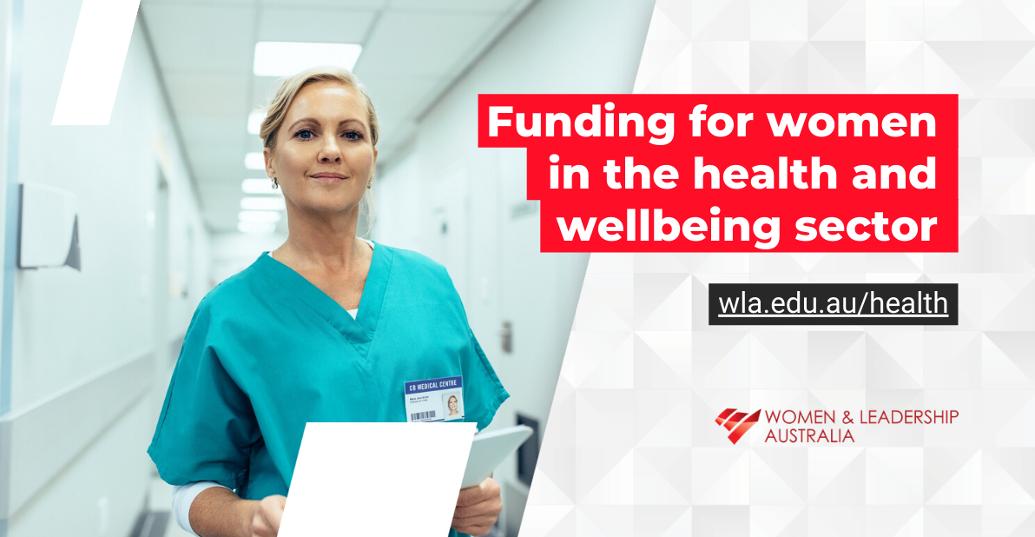
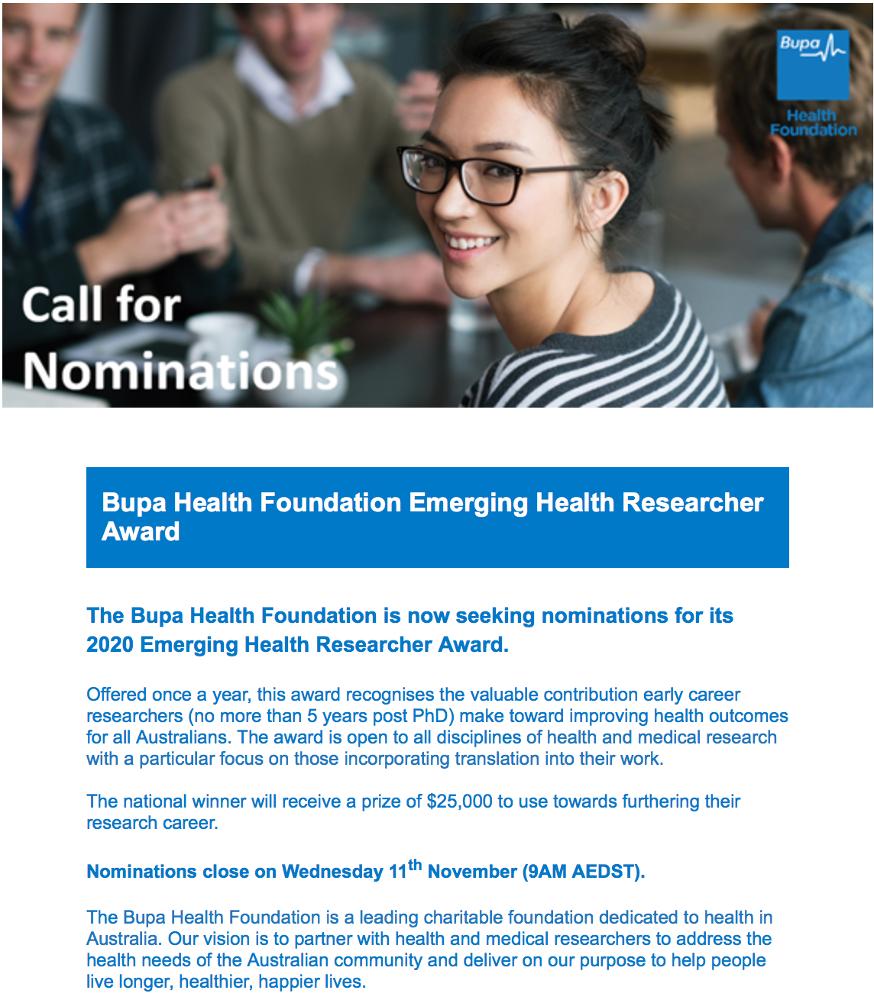

17th November 2020 at 1-2pm AEDT via Zoom
The Australian Pain Society, like many societies, is tackling the loss of their annual scientific meeting by providing a range of new online content to engage and connect clinicians and researchers across the country.
To support these efforts, the Basic Pain Research Special Interest Group (BPR SIG) is launching a new monthly online series, known as the “BPR Pain Hour”, to showcase the latest research from Australian pain researchers, in the lead up to the Annual Scientific Meeting in Canberra, April 2021. The mission of our SIG is to share, improve and promote scientific knowledge and understanding of the mechanisms of nociception and pain across all levels of investigation: from molecular and cellular analyses, to pre-clinical or clinical studies. This forum will provide an informal platform to promote and share our research and insights, from ECRs (including students) and senior colleagues.

Summary
Management of acute and chronic pain are integral to the practice of anaesthesiology. Research has an important role to play in understanding mechanisms that contribute to safe and effective pain management in
this setting. The speakers in this session are anaesthetists that are actively engaged in both basic and clinical research that informs the way they manage acute and chronic pain. Michael Barrington will talk about cadaveric dye injection studies that have been integral to understanding the anatomical mechanisms of newly described ultrasound-guided interventions for acute pain management using local anaesthesia, and will focus this presentation specifically on erector spinae plane blockade. Andrei Sdrulla will talk about animal studies that have informed the use of spinal cord stimulation for the management of chronic pain. Their work will be of interest to both basic and clinical researchers, and anyone else interested in anaesthesiology for pain management. They offer important insights into how clinical practice in anaesthesiology can be informed by knowledge gained in basic research.
The invited speakers:
Associate Professor Michael Barrington, St Vincent’s Hospital, VIC Dr Andrei Sdrulla, Oregon Health & Science University, US
All are welcome to attend, including postgraduate students. We look forward to seeing you there, please register here
Renewal notices for 2021 will be sent by email to members in late November.
Thank you for your continued support and membership of the APS.
Please note:
1. We understand that circumstances change, so each year we ask you to select your appropriate level of membership.
2. This system of self-reporting subscription levels was implemented in 2009 for the benefit and fairness of all members.
Please refer to the rates below for your 2021 membership fee:
a. Regular A $110
b. Regular B $205
c. Regular C $310
d. Retired $65 Concessional Rate
e. Student $65 Concessional Rate
Before renewing, please ensure you review and update your member profile online. Payments can be made by Credit Card, BPAY, or Cheque.
Do you know that the Australian Pain Society is a registered charity? Your donation will help the Society to promote the prevention and control of diseases in human beings associated with pain.
All donations of $2 or more to APS are tax-deductible.






























JOIN US ONLINE
#AusPainSoc
Australian.Pain.Society

@AusPainSoc
For sponsorship and exhibition opportunities or more information please contact the APS Conference Secretariat
DC Conferences Pty Ltd
P: 61 2 9954 4400
E: aps2021@dcconferences.com.au

W: dcconferences.com.au/aps2021
Allan Basbaum is a professor and Chair of the Department of Anatomy at the University California San Francisco, USA. His research addresses the molecular mechanisms that underlie the generation of persistent pain after tissue or nerve injury.

Expressions of interest online at: dcconferences.com.au/aps2021
REGISTRATIONS OPEN
4 NOVEMBER 2020
DEADLINES
Topical Sessions 28 September 2020

Papers & Posters 27 October 2020 Rising Star Award 27 October 2020 Early Bird Registration 23 February 2021
INCLUDING
Pre-Conference Workshops
Topical Sessions Trainee Session Extensive Industry Exhibition
Sponsored Sessions Discipline Sub Group Meetings Welcome Reception Conference Gala Dinner
Siri Leknes is a Professor of Social and Affective Neuroscience at the University of Oslo, Norway and a Senior Researcher at Oslo University Hospital. Her lab, the Leknes Affective Brain lab (LAB lab) studies how the brain and body give rise to pleasurable and painful feelings, and how these feelings are connected to decisions and behaviour.
Amanda C de C Williams is Reader (Associate Professor) in clinical health psychology at University College London; consultant clinical psychologist at the Pain Management Centre, University College London Hospital, UK; and research consultant for the International Centre for Health and Human Rights.


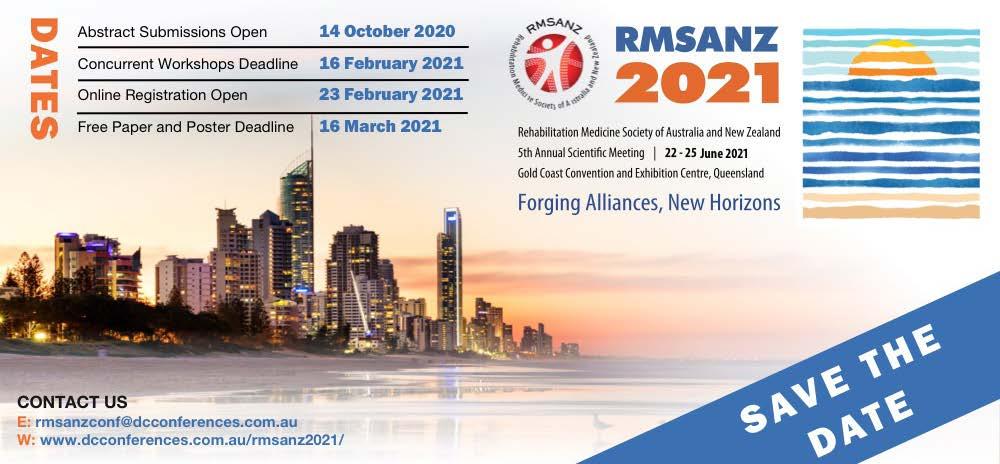
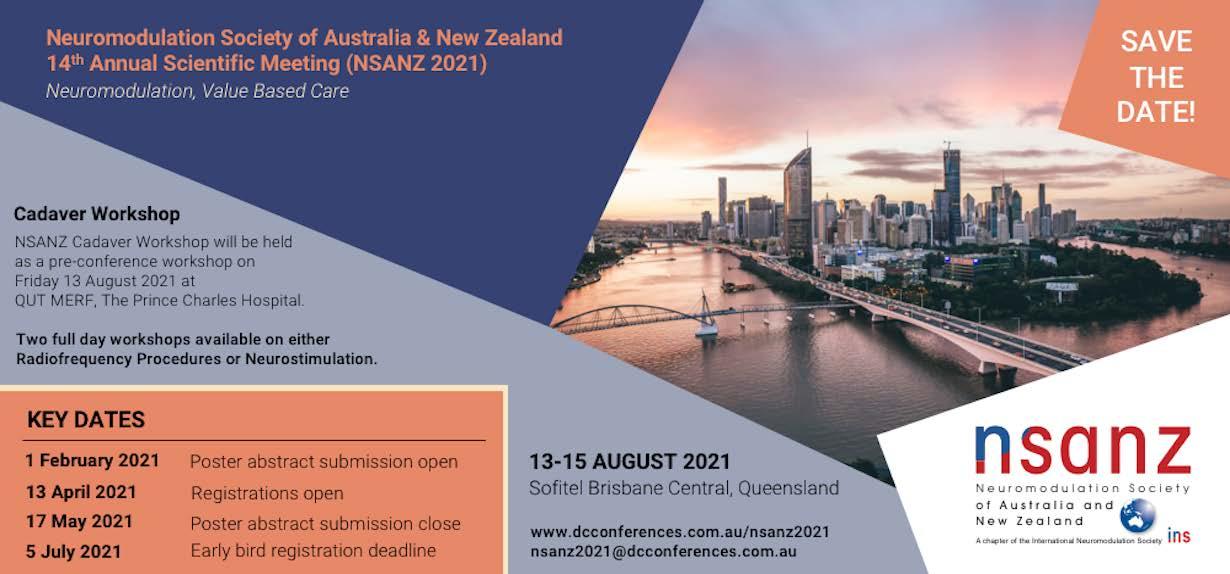
The 2021 Combined Spring Meeting of the Faculty of Pain Medicine and the Hong Kong College of Anaesthesiologists


15-17 October 2021


Millennium hotel
Queenstown, New Zealand

• NPSMedicineWise - Opioids: Communication Videos: https://www.nps.org.au/opioids-communication-videos
Other items of interest for our members:
• Latest opioid data from the Australian Bureau of Statistics: Opioid induced deaths in Australia. https://www.abs.gov.au/articles/opioid-induced-deaths-australia
• Australia’s annual overdose report 2019 from the Pennington institute: http://www.penington.org.au/australias-annual-overdose-report-2019/
• The Third Australian Atlas of Healthcare Variation: This series explores how healthcare use in Australia varies depending on where people live. It investigates reasons for variation that may be unwarranted, and provides specific achievable actions to reduce unwarranted variation https://www.safetyandquality.gov.au/atlas
• Painaustralia eNewsletter latest issue, available online at http://www.painaustralia.org.au/media/enews
• ePPOC: electronic Persistent Pain Outcomes Collaboration: The electronic Persistent Pain Outcomes Collaboration (ePPOC) is an Australasian initiative that aims to improve the quality of care and outcomes for people who experience chronic pain. For more information about ePPOC, refer to the website: http://ahsri.uow.edu.au/eppoc/index.html
• PainHEALTH website: painHEALTH‘s aim is to help health consumers with musculoskeletal pain access reliable, evidence-based information and tips to assist in the co-management of musculoskeletal pain. painHEALTH is an initiative of the Department of Health, Western Australia. http://painhealth.csse.uwa.edu.au/
• Stanford University: CHOIR Collaborative Health Outcomes Information Registry https://choir.stanford.edu/
• Opioid Podcasts for GPs: These podcasts are produced by David Outridge GP, and FAChAM Trainee as a project under the auspices of Dr Steven Kelly Staff Specialist in Addiction Medicine, Kullaroo Clinic Gosford. A 20 week series from the Hunter Postgraduate Medical Institute (University of Newcastle): http://www.gptraining.com.au/recent-podcasts
• Airing Pain: Pain resources via an online radio show produced by Pain Concern, a UK registered Charity: http://painconcern.org.uk/airing-pain/
• Digital Health Guide: Developed by Primary Health Network Tasmania, check out the pain resources by accessing the link https://digitalhealthguide.com.au/Account/LogOn?ReturnUrl=%2fSpecialtyFormulary%2f2 At login, Username: connectingcare, Password: health
• Indigenous Resources: New webpage on the APS website aggregating Indigenous resources: https://www.apsoc.org.au/Indigenous-Resources
NPS MedicineWise resources:
• Choosing Wisely Australia – News & media: https://www.choosingwisely.org.au/news-events/mediareleases/choosing-wisely-resource-addresses-patient-opioid-knowledge-gap
• Over the counter codeine – changes to supply: https://www.nps.org.au/medical-info/clinical-topics/ over-the-counter-codeine-changes-to-supply
• Medicines with codeine – what you need to know: https://www.nps.org.au/medical-info/consumerinfo/medicines-with-codeine-what-you-need-to-know
• Information about opioids and chronic non-cancer pain: U-tube clip (5.39mins) https://www.youtube. com/watch?v=8R4RT0pUCf4&feature=share&fbclid=IwAR2dbhzgEAcc7B-ogq2a6Xhud5FDkbciPbdJ9 pb94GnQI6pAeifGd1VP-_I
• Opioids: Communications videos: https://www.nps.org.au/opioids-communication-videos
TGA
• Codeine information hub: https://www.tga.gov.au/codeine-info-hub
NSW Agency for Clinical Innovation resources:
• Brainman and Pain Tool Kit translations, SEP15: http://www.aci.health.nsw.gov.au/chronic-pain/translated-resources
• Pain Management Resources: http://www.aci.health.nsw.gov.au/resources/pain-management
• Quicksteps to Manage Chronic Pain in Primary Care: http://www.aci.health.nsw.gov.au/chronic-pain/health-professionals/quick-steps-to-managechronic-pain-in-primary-care
- Built into Quicksteps: “How to de-prescribe and wean opioids in general practice”: http://www.aci.health.nsw.gov.au/chronic-pain/health-professionals/quick-steps-to-managechronic-pain-in-primary-care/how_to_de-prescribe_and_wean_opioids_in_general_practice
• A list of helpful apps for consumers and clinicians now available at: http://www.aci.health.nsw.gov.au/chronic-pain/health-professionals/management-of-chronic-pain
• Chronic Pain in the ED: https://www.aci.health.nsw.gov.au/networks/eci/clinical/clinical-resources/ clinical-tools/pain-management/chronic-pain-in-the-ed
Mrs Martina Egan Physiotherapy
Mr Simon Gao Psychology
Dr Julia Gilmartin-Thomas Geriatrics
These dates and events are current at the time of publication. Due to the current health concerns with COVID-19, we recommend you make your own inquiries before planning to attend
4-6 November 2020
Wounds Australia
Wounds 2020
Brisbane Convention and Exhibition Centre, Brisbane, QLD
https://wounds2020.com.au/?utm_ source=australianpainsociety&utm_ medium=banner&utm_campaign=website
5 November 2020
Faculty of Pain Medicine (FPM) Hong Kong College of Anaesthesiologists Combined Spring Meeting Webinar
Delivering pain management in the time of COVID-19 and telehealth
Online, Virtual, Online Webinar
https://www.anzca.edu.au/events-courses/events/ major-events/fpm-national-events/2020-fpmcombined-spring-meeting-webinar
6-8 November 2020
European Pain Federation EFIC Virtual Pain Education Summit
Online, Virtual, Online Conference
https://europeanpainfederation.eu/virtual-paineducation-summit/
11-13 November 2020
Clinical Oncology Society of Australia (COSA) 47th Annual Scientific Meeting
Convention Centre, Brisbane, QLD https://www.cosa.org.au/events/annual-scientificmeeting/
14-15 November 2020
Convenor: Dr Marc Russo PAIN2020
Online, Virtual, Online Conference https://dcconferences.eventsair.com/pain2020/
16- 28 November 2020
RACGP - GP20
Focus on COVID-19, learnings from and postpandemic, new technologies in digital space
Satellite events in each Capital City, Hybrid Interactive, Online Conference
https://www.racgp.org.au/gp20/gp20-home
24-27 Feburary 2021
Australian College of Rural and Remote Medicine (ACRRM) and Rural Doctors Association of Australia (RDAA)
Rural Medicine Australia - Respond. Recover. Reflect. Renew.
The Crowne Plaza, Hunter Valley, NSW
https://rma.acrrm.org.au/register
4-6 March 2021
Exercise & Sports Science Australia (ESSA) Research to Practice 2021
Perth Convention and Exhibition Centre, Perth, WA
http://researchtopractice2020.com.au
12-14 March 2021
Australia New Zealand Headache Society
ANZHS Annual Scientific Meeting
Sofitel Wentworth Hotel , Sydney , NSW
https://anzheadachesociety.org/2020-anzhsheadache-annual-scientific-meeting/
18-20 March 2021
New Zealand Pain Society Annual Scientific Meeting 2021
Making the Connection - Cortex, Culture and Community
Copthorne Hotel, Bay of Islands, New Zealand
http://www.nzps2020.nz/
27 March 2021
Pain Association of Singapore Annual Scientific Meeting 2021
Managing MSK Pain: Mind, Movement and Medications Online
https://www.pain-asm.com
9-11 April 2021
Spine Society of Australia
32nd Annual Scientific Meeting
International Convention Centre, Sydney, NSW https://dcconferences.eventsair.com/ssa-2021/
18-21 April 2021
Australian Pain Society 41st Annual Scientific Meeting
In the IASP Global Year Against Back Pain National Convention Centre, Canberra, ACT https://www.dcconferences.com.au/aps2021/
30 April 2021
Faculty of Pain Medicine (FPM) Symposium 2021
Pain medicine: The mysterious art
Melbourne Convention and Exhibition Centre, Melbourne, VIC https://www.anzca.edu.au/events-courses/events/ fpm-events/fpm-national-events/2020-faculty-ofpain-medicine-symposium
19-21 May 2021
Australian & New Zealand Society for Geriatric Medicine (ANZSGM)
Annual Scientific Meeting 2021
Sofitel Melbourne on Collins, Melbourne, VIC http://www.anzsgmconference.org/
21-23 May 2021
Australian Psychological Society College of Clinical Psychologists
Complexity in Practice - 2021 Annual Conference
Sofitel Brisbane Central, Brisbane, QLD https://www.psychology.org.au/APS-CCLIN-Conf/2020
22-25 June 2021
Rehabilitation Medicine Society of Australia and New Zealand (RMSANZ)
5th Annual Scientific Meeting: Forging Alliances, New Horizons
Gold Coast Convention and Exhibition Centre, Gold Coast, QLD
https://www.dcconferences.com.au/rmsanz2021/
23-25 June 2021
Occupational Therapy Australia
Inspired Insights for Brighter Futures - Hybrid Conference
Cairns Convention Centre, Cairns, QLD
https://www.otaus2021.com.au
27 June-1 July 2021
International Association for the Study of Pain (IASP)
IASP 2021 World Congress on Pain
TBA, Amsterdam, Netherlands
https://www.iaspworldcongress.org
13-15 August 2021
Neuromodulation Society of Australia & New Zealand (NSANZ)
Neuromodulation, Value Based Care
Sofitel Brisbane Central, Brisbane, QLD
https://www.dcconferences.com.au/nsanz2021/
21-23 October 2021
Australian Physiotherapy Association
APA 2021 Conference
Brisbane Convention and Exhibition Centre, Brisbane, QLD
https://australian.physio/pd/conferences-andmasterclasses
11-13 November 2021
Australian and New Zealand Association of Oral & Maxillofacial Surgeons
ANZAOMS 2021 Conference
Hotel Grand Chancellor, Hobart, Tasmania https://www.anzaomsconference.com.au/
24-27 March 2022
IASP Pain in Childhood SIG
ISPP 2022 13th International Symposium on Pediatric Pain: Diversity, Equity, Access Cordis Hotel, Auckland, New Zealand http://www.ispp2022.nz/home.html
Vision:
All people will have optimal access to pain prevention and management throughout their life.
Mission:
The Australian Pain Society is a multidisciplinary association whose mission is to advance pain prevention, management and clinical practice.
Priorities:
In order to achieve our mission, the Australian Pain Society will provide:
• Education
• Advocacy
• Research
• Services and resources
• Membership
• Good governance and operations
President:
A/Prof Anne Burke

Central Adelaide Local Health Network
Royal Adelaide Hospital
Adelaide SA 5000
Tel: 08 7074 2835 Fax: 08 7074 6247
President-Elect:
Ms Trudy Maunsell
Acute Pain Service
Princess Alexandra Hospital
Woolloongabba QLD 4102
Tel: 07 3176 5547 Fax: 07 3176 5102
Secretary:
Dr Will Howard

VIC
Tel: 03 9496 3800
Treasurer
Mr Tim Austin
Camperdown Physiotherapy
Newtown NSW 2042
Tel: 02 9517 1787 Fax: 02 9516 24911
ACT Director:
Dr Andrew Watson Calvary Hospital



Canberra ACT 2617
Tel: 02 6201 6352 Fax: N/A
NSW Director:
Dr Tim Ho

Inner West Pain Centre
RPA Medical Centre
Newtown NSW 2042
Tel: 02 9517 1764 Fax: 02 9517 1832
NT Director:
Ms Diann Black
Chronic Pain Service
Palmerston Regional Hospital
Holtze NT 0829
Tel: 08 7979 9502 Fax: 08 7979 9792
QLD Director:
Mrs Joyce McSwan
Gold Coast Primary Health Network
Persistent Pain Program, QLD
Tel: 0412 327 795 Fax: 07 3539 9801
SA Director:
Dr Michelle Harris
Royal Adelaide Hospital and Lyell McEwin Hospital
Adelaide SA
Email: michelle.harris2@sa.gov.au
TAS Director:
Mrs Dinah Spratt
Physiotas Physiotherapy
Shearwater TAS 7307
Tel: 03 6428 7500 Fax: 03 6424 7811
VIC Director:
Dr Laura Prendergast Pain Service, Austin Health






Heidelberg VIC 3084
Tel: 03 9496 3134 or 03 5832 3020
WA Director: Mr Shadreck Tozana
Functional Revival
Albany WA
Tel: 0437 541 165
Immediate Past President:
Ms Fiona Hodson
Hunter Integrated Pain Service
John Hunter Hospital Campus
New Lambton NSW 2305
Tel: 02 4922 3435 Fax: 02 4922 3438
SPC Chair:
A/Prof Kevin Keay


Department of Anatomy
University of Sydney
Sydney NSW 2006
Tel: 02 9351 4132 Fax: 02 9351 2817
IASP Liaison:
Professor Michael Nicholas

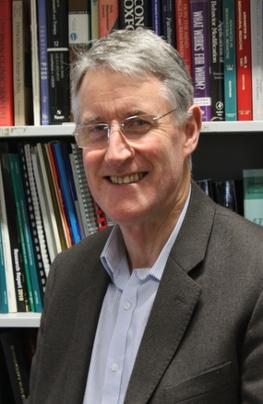
Pain Management Research Institute
Royal North Shore Hospital
St Leonards NSW 2065
Tel: 02 9926 7894 Fax: 02 9662 6279
Website: https://www.iasp-pain.org
Communications Coordinator:
A/Prof Anne Burke
Central Adelaide Local Health Network
Royal Adelaide Hospital
Adelaide SA 5000
Tel: 08 7074 2835 Fax: 08 7074 6247
Newsletter Editor:
Dr Lincoln Tracy
School of Public Health and Preventive Medicine
Monash University
Melbourne VIC 3004
Tel: 03 9903 0288
Newsletter Assistant Editor:
Dr Joanne Harmon
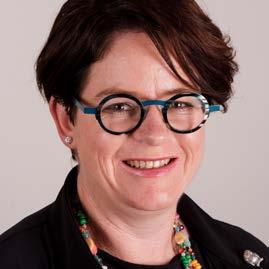

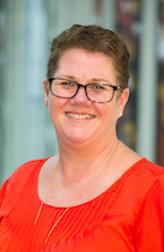
School of Clinical and Health Sciences
University of South Australia
Adelaide SA 5000
Tel: 08 8302 1442
PhD Scholarship Chair:
A/Prof Michael Farrell
Department of Medical Imaging and Radiation Services
Monash University
Clayton VIC 3800
Tel: 03 9905 6094 Fax: 03 9902 9500
Secretariat:
DC Conference & Association
Management Pty Ltd
PO Box 637
North Sydney, NSW 2059
Tel: 02 9016 4343
Email: aps@apsoc.org.au
Website: apsoc.org.au